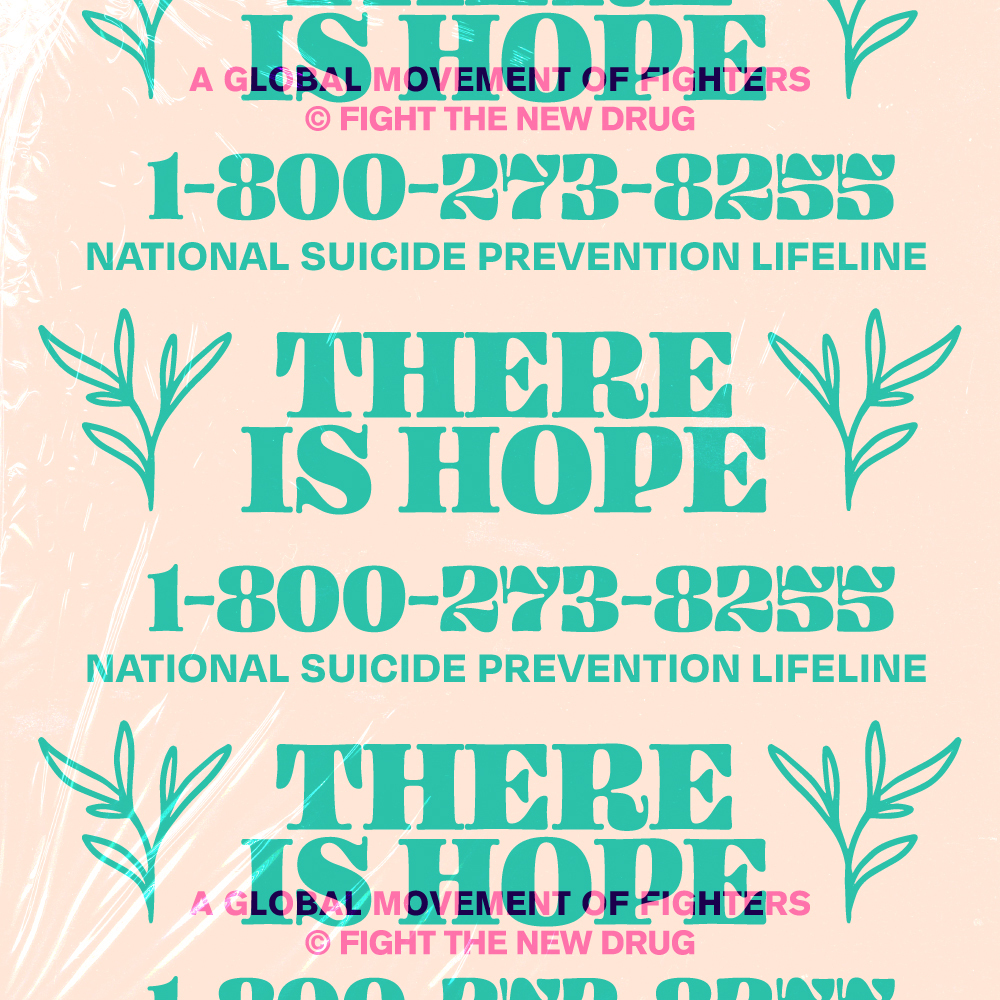This article contains affiliate links. Fight the New Drug may receive financial support from purchases made using affiliate links.
Many people contact Fight the New Drug to share their personal stories about how porn has affected their life or the life of a loved one. We consider these personal accounts very valuable because, while the science and research is powerful within its own right, personal accounts from real people seem to really hit home about the damage that pornography does to real lives.
We received a story from a Fighter who realized how much pornography can contribute to feelings of depression, and isolation. This post is not to say that stopping a porn habit can magically cure depression, while porn could be a part of contributing to the larger problem. This Fighter's experience offers a glimpse of hope for those who may feel like their porn is holding them back from living a healthy, full life.
There is hope. National Suicide Prevention Lifeline: 1-800-273-8255, or call or text 988.
Hey FTND!
Let me just say I am a big supporter of everything this movement is about. I did find something interesting that I wanted to share with you that can either encourage, warn, or bring more info to other Fighters out there!
I was first exposed to porn at the age of 11 in 2002. I became hooked on it as time progressed and the access became easier. But a strange trend followed me as well: depression. My depression started around the same time span but for the longest time, I never correlated the two. I would watch porn for a full day, and then be depressed for the week.
The porn made me feel so disconnected and ashamed that I didn’t want to be around anyone, but instead dwell in the garbage that I just watched. Porn made me feel less human, but I kept coming back to it, it was my drug that gave me false pleasure. I would watch porn for about 5 minutes, and then just feel like dirt for the rest of day, and sometimes the week.
This pattern continued all way up to 2011 when I decided to start cleaning myself up from porn because my depression got to the point of suicidal thoughts and tendencies.
I went a solid six months without watching porn and I noticed how my depression was absent as well. I felt happier, life seemed very enjoyable, and I felt connected to the people around me, while before, porn had caused me to feel dehumanized to society.
I battled being on and off and on again with porn, until 2013, when I truly made a breakthrough and went a full year without seeing it. Even to this day, I have not viewed a single porn image or video. Since that day of October 24, 2013, my depression has not shown up once in my life. I’ve surrounded myself with people who remind me that I don’t need porn to find happiness or pleasure.
Overall, my two biggest influences were the thought of that depression coming back, and this movement that exposed me to the true dark side of porn and what it can do to a person. Porn was my “cocaine,” but once I cleaned up, I got my life back.
Thank you FTND for all you do and believe! Keep on fightin’!
–J.
Why This Matters
Mental health can be impacted by porn consumption.
Note that this article isn’t meant to be an official diagnostic tool for anyone, it’s only meant to help you think through how porn might be impacting you if your experiences are anything like this Fighter’s. Talk to a mental health professional to get an official diagnosis for any mental health issues.
That being said, we receive thousands of stories from people all over the world, some detailing the deep, depressive feelings they get when they watch porn. This post is not to say that stopping a porn habit is an automatic cure for depression, while it could be one part of the larger problem.
“The more one uses pornography, the more lonely one becomes,” says Dr. Gary Brooks, a psychologist who has worked with porn addicts for the last 30 years.Brooks, G. R., (1995). The Centerfold Syndrome: How Men Can Overcome Objectification And Achieve Intimacy With Women. San Francisco: Bass. Cited In Yoder, V. C., Virden, T. B., & Amin, K. (2005). Internet Pornography And Loneliness: An Association? Sexual Addiction And Compulsivity, 12, 19-44. Doi:10.1080/10720160590933653Copy “Any time [a person] spends much time with the usual pornography usage cycle, it can’t help but be a depressing, demeaning, self-loathing kind of experience.”Interview With Dr. Gary Brooks, Oct. 23, 2013.Copy
The worse people feel about themselves, the more they seek comfort wherever they can get it. Normally, they would be able to rely on the people closest to them to help them through their hard times—a partner, friend, or family member. But most porn users aren’t exactly excited to tell anyone about their porn habits, least of all their partner. So they turn to the easiest source of “comfort” available: more porn.
And the cycle continues.
According to researcher Dr. Ana Bridges, as a porn consumer withdraws from his or her relationships, they experience “increased secrecy, less intimacy and also more depression.”Weir, K. (2014, April). Is Pornography Addictive? Monitor On Psychology. 45(4) 46.Copy
Studies have found that when people engage in an ongoing pattern of “self-concealment”—which is when they do things they’re not proud of and keep them a secret—it not only hurts their relationships and leaves them feeling lonely, but also makes them more vulnerable to serious psychological issues.Laird, R. D., Marrero, M. D., Melching, J. A., And Kuhn, E. S. (2013). Information Management Strategies In Early Adolescence: Developmental Change In Use And Transactional Associations With Psychological Adjustment. Developmental Psychology, 49(5), 928–937. Doi:10.1037/A0028845Copy Luoma, J. B., Et. Al. (2013). Self-Stigma In Substance Abuse: Development Of A New Measure. Journal Of Psychopathology And Behavioral Assessment, 35, 223–234. Doi:10.1007/S10862-012-9323-4Copy Rotenberg, K. J., Bharathi, C., Davies, H., And Finch, T. (2013). Bulimic Symptoms And The Social Withdrawal Syndrome. Eating Behaviors, 14, 281–284. Doi:10.1016/J.Eatbeh.2013.05.003Copy Frijns, T. And Finkenauer, C. (2009). Longitudinal Associations Between Keeping A Secret And Psychosocial Adjustment In Adolescence. International Journal Of Behavioral Development, 33(2), 145–154. Doi:10.1177/0165025408098020Copy For both male and female porn consumers, their habit is often accompanied by problems with anxiety, body-image issues, poor self-image, relationship problems, insecurity, and depression.Flisher, C. (2010). Getting Plugged In: An Overview Of Internet Addiction. Journal Of Paediatrics And Child Health 46: 557–559. Doi:10.1111/J.1440-1754.2010.01879.XCopy Layden, M. A. (2010). Pornography And Violence: A New Look At The Research. In Stoner, J., & Hughes, D. (Eds.) The Social Costs Of Pornography: A Collection Of Papers (Pp. 57–68). Princeton, NJ: Witherspoon InstituteCopy Kafka, M. P. (2000). The Paraphilia-Related Disorders: Nonparaphilic Hypersexuality And Sexual Compulsivity/Addiction. In Leiblum, S. R., & Rosen, R. C. (Eds.) Principles And Practice Of Sex Therapy, 3rd Ed. (Pp. 471–503). New York: Guilford Press.Copy
We exist because we believe everyone deserves to live their best, healthiest life possible, and that includes being aware and understanding how pornography can take away from real-life experiences and healthy relationships—including the healthy relationship you have with yourself and your mental health.
In the end, pornography can detract from all the great things life has to offer, and consumers deserve to know the facts: watching isn’t worth it.
There is hope. National Suicide Prevention Lifeline: 1-800-273-8255, or call or text 988.
Need help?
For those reading this who feel they are struggling with pornography, you are not alone. Check out Fortify, a science-based recovery platform dedicated to helping you find lasting freedom from pornography. Fortify now offers a free experience for both teens and adults. Connect with others, learn about your unwanted porn habit, and track your recovery journey. There is hope—sign up today.
Fight the New Drug may receive financial support from purchases made using affiliate links.

Your Support Matters Now More Than Ever
Most kids today are exposed to porn by the age of 12. By the time they’re teenagers, 75% of boys and 70% of girls have already viewed itRobb, M.B., & Mann, S. (2023). Teens and pornography. San Francisco, CA: Common Sense.Copy —often before they’ve had a single healthy conversation about it.
Even more concerning: over half of boys and nearly 40% of girls believe porn is a realistic depiction of sexMartellozzo, E., Monaghan, A., Adler, J. R., Davidson, J., Leyva, R., & Horvath, M. A. H. (2016). “I wasn’t sure it was normal to watch it”: A quantitative and qualitative examination of the impact of online pornography on the values, attitudes, beliefs and behaviours of children and young people. Middlesex University, NSPCC, & Office of the Children’s Commissioner.Copy . And among teens who have seen porn, more than 79% of teens use it to learn how to have sexRobb, M.B., & Mann, S. (2023). Teens and pornography. San Francisco, CA: Common Sense.Copy . That means millions of young people are getting sex ed from violent, degrading content, which becomes their baseline understanding of intimacy. Out of the most popular porn, 33%-88% of videos contain physical aggression and nonconsensual violence-related themesFritz, N., Malic, V., Paul, B., & Zhou, Y. (2020). A descriptive analysis of the types, targets, and relative frequency of aggression in mainstream pornography. Archives of Sexual Behavior, 49(8), 3041-3053. doi:10.1007/s10508-020-01773-0Copy Bridges et al., 2010, “Aggression and Sexual Behavior in Best-Selling Pornography Videos: A Content Analysis,” Violence Against Women.Copy .
From increasing rates of loneliness, depression, and self-doubt, to distorted views of sex, reduced relationship satisfaction, and riskier sexual behavior among teens, porn is impacting individuals, relationships, and society worldwideFight the New Drug. (2024, May). Get the Facts (Series of web articles). Fight the New Drug.Copy .
This is why Fight the New Drug exists—but we can’t do it without you.
Your donation directly fuels the creation of new educational resources, including our awareness-raising videos, podcasts, research-driven articles, engaging school presentations, and digital tools that reach youth where they are: online and in school. It equips individuals, parents, educators, and youth with trustworthy resources to start the conversation.
Will you join us? We’re grateful for whatever you can give—but a recurring donation makes the biggest difference. Every dollar directly supports our vital work, and every individual we reach decreases sexual exploitation. Let’s fight for real love:




